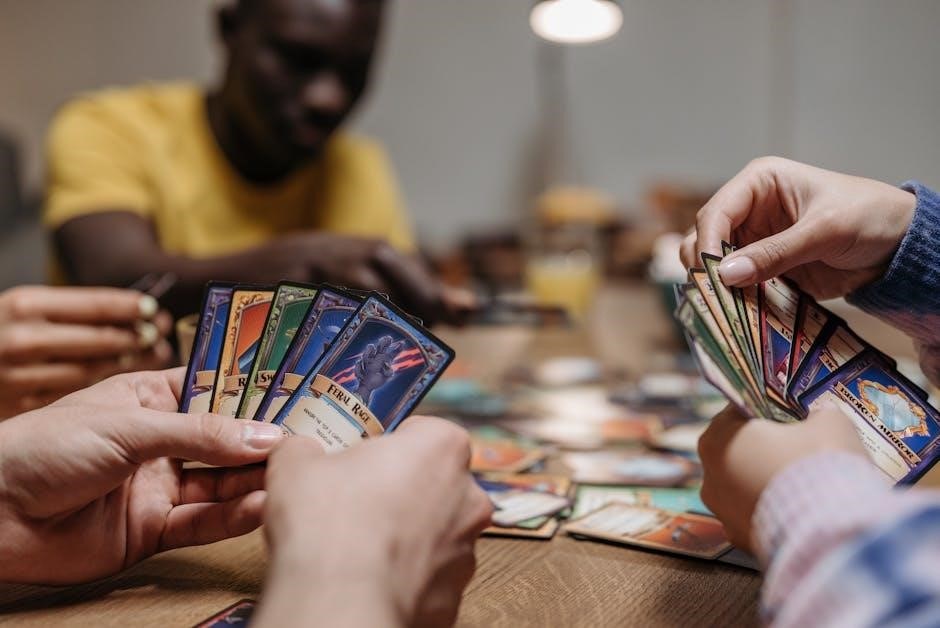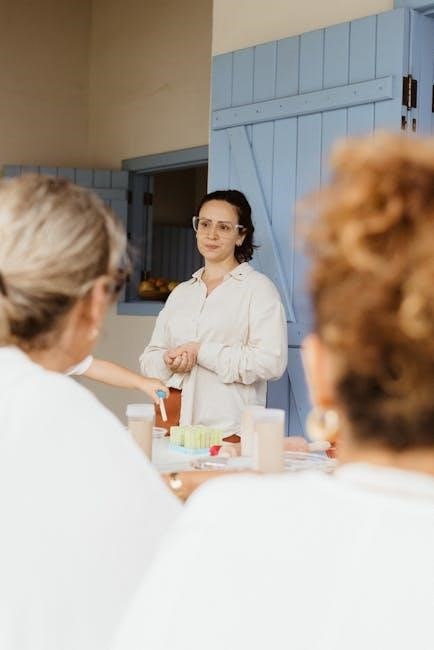Social skills are essential for effective communication and building strong relationships. They encompass verbal and non-verbal interactions, empathy, and understanding others’ perspectives. Developing these skills enhances personal and professional interactions, fostering collaboration and mutual respect. Teaching social skills is crucial for individuals of all ages, as they are key to navigating everyday interactions successfully.
1.1 Definition and Importance of Social Skills
Social skills refer to the abilities necessary for effective communication, interaction, and relationship-building. They include verbal and non-verbal behaviors, such as active listening, empathy, and conflict resolution. These skills are vital for personal and professional success, enabling individuals to navigate social situations confidently. Strong social skills foster collaboration, mutual respect, and emotional well-being. Research indicates that social incompetence can lead to negative outcomes, while proficiency in social skills enhances mental health, employability, and overall life satisfaction. Developing these skills is essential for thriving in both personal and professional environments.
1.2 The Role of Social Skills in Personal and Professional Life
Social skills are fundamental for fostering meaningful connections and achieving success in both personal and professional environments. In personal life, they enhance relationships, improve communication, and reduce misunderstandings. Professionally, strong social skills are linked to career advancement, effective teamwork, and leadership effectiveness. They enable individuals to navigate workplace dynamics, build trust, and collaborate effectively. In both realms, social skills contribute to emotional well-being, conflict resolution, and a sense of belonging. Developing these skills is essential for personal fulfillment and professional growth, making them a cornerstone of lifelong success and happiness.
Understanding the Components of Social Skills
Social skills encompass various competencies, including communication, emotional intelligence, and relationship management. These components work together to facilitate effective interactions and build meaningful connections in diverse settings.
2.1 Verbal Communication Skills
Verbal communication skills are essential for conveying ideas, expressing emotions, and engaging in meaningful conversations. They involve clarity, tone, and the ability to adapt language to different audiences and contexts. Effective verbal communication fosters understanding, collaboration, and trust in personal and professional relationships. Key elements include articulation, vocabulary, pacing, and the ability to listen actively while speaking. Practicing active speaking, asking questions, and seeking feedback can enhance verbal communication. Strong verbal skills also involve being concise, respectful, and aware of cultural differences, ensuring messages are delivered clearly and respectfully in all interactions.
2.2 Non-Verbal Communication Skills
Non-verbal communication skills involve conveying messages through facial expressions, body language, gestures, and eye contact. These cues often reveal emotions, attitudes, and intentions, complementing or even overriding verbal messages. Key aspects include maintaining appropriate eye contact, using open and approachable body language, and being aware of personal space. Non-verbal signals can enhance trust, credibility, and rapport in interactions. Cultural differences play a significant role, as interpretations of non-verbal cues can vary widely. Developing awareness of these signals improves communication effectiveness, helping individuals navigate social and professional situations with greater confidence and sensitivity to others’ unspoken messages.
2.3 Active Listening and Empathy
Active listening and empathy are critical social skills that foster deeper connections and understanding in interactions. Active listening involves fully engaging with others, focusing on their words, tone, and emotions, rather than preparing one’s own response. It includes nodding, maintaining eye contact, and asking clarifying questions. Empathy, the ability to share and understand others’ feelings, strengthens trust and rapport. Together, these skills help individuals navigate conflicts, provide emotional support, and build meaningful relationships. Mastering active listening and empathy enhances communication, resolves misunderstandings, and fosters a supportive and inclusive environment in both personal and professional settings.

The Impact of Social Skills on Relationships
Social skills significantly influence personal and professional relationships by fostering trust, improving communication, and enhancing emotional connections. Strong social skills help resolve conflicts and promote mutual understanding, creating stronger, more meaningful bonds in all aspects of life.
3.1 Building Stronger Personal Relationships
Strong social skills are essential for fostering deeper, more meaningful personal relationships. Empathy, active listening, and clear communication help individuals understand and connect with others on a profound level. Trust and emotional intimacy are built when people feel heard and valued. Effective conflict resolution skills prevent misunderstandings from escalating, ensuring relationships remain healthy and resilient. By demonstrating genuine interest and respect, individuals can strengthen bonds with family, friends, and partners. These skills create a foundation for lasting connections, allowing relationships to grow and thrive over time.
3.2 Improving Professional and Workplace Relationships

Strong social skills significantly enhance professional relationships, fostering a positive work environment. Effective communication, active listening, and understanding non-verbal cues ensure clarity and reduce misunderstandings. Emotional intelligence helps in empathizing with colleagues, building trust, and resolving conflicts constructively. Collaborative teamwork is strengthened when individuals respect diverse perspectives and contribute openly. Developing approachable and inclusive behaviors encourages open dialogue, promoting a culture of mutual respect. These skills not only improve workplace dynamics but also contribute to personal and organizational success, making employees more valued and effective team members.
3.3 Social Skills and Conflict Resolution
Social skills are essential for effective conflict resolution, enabling individuals to navigate disagreements constructively. Strong communication helps express concerns clearly, while active listening ensures understanding of opposing views. Empathy allows for acknowledging others’ emotions, reducing tension and fostering compromise. Non-verbal cues, such as open body language, signal receptiveness to resolution. Problem-solving skills facilitate finding mutually beneficial solutions. By managing emotions and remaining calm, individuals can de-escalate conflicts and build stronger relationships. These skills promote collaboration and respect, leading to resolution that satisfies all parties involved and strengthens overall connections.

Teaching Social Skills in Educational Settings
Schools play a vital role in fostering social skills through structured programs, promoting communication, empathy, and teamwork among students, preparing them for lifelong social interactions and success.
4.1 Integrating Social Skills into School Curricula
Integrating social skills into school curricula involves incorporating communication, empathy, and problem-solving into daily lessons. Schools can weave these skills into subjects like English, math, or science through group activities, role-playing, and discussions. For instance, teamwork exercises in science projects or debating in history classes can foster collaboration and conflict resolution. Teachers can also dedicate specific time for social-emotional learning (SEL) activities, such as mindfulness practices or peer discussions on emotions. This holistic approach ensures students develop both academic and interpersonal competencies, preparing them for future social interactions and relationships. Consistent practice across all grades reinforces these essential life skills. Schools can use social skills PDF resources to design age-appropriate lesson plans.
4.2 Strategies for Teachers to Promote Social Skills
Teachers can promote social skills by creating interactive and inclusive classroom environments. Role-playing activities help students practice real-life interactions and conflict resolution. Group projects foster teamwork and collaboration, while peer discussions encourage empathy and understanding. Positive reinforcement, such as verbal praise, motivates students to exhibit positive behaviors. Teachers can also model good social skills themselves, as students often mimic adult behaviors. Incorporating social-emotional learning (SEL) into daily routines and using visual aids like behavior charts can reinforce these skills. Downloadable social skills PDF resources provide structured lesson plans and activities to support these efforts.
4.3 The Role of Parents in Reinforcing Social Skills
Parents play a crucial role in reinforcing social skills by modeling positive behaviors and providing consistent guidance. Encouraging open communication at home helps children express emotions and develop empathy. Participating in family activities fosters teamwork and cooperation. Parents can also practice social interactions through role-playing or discussing hypothetical situations. Positive reinforcement, such as praising kind actions, motivates children to repeat those behaviors. Accessing social skills PDF resources provides parents with structured activities and strategies to support their child’s development. Regular feedback and encouragement create a nurturing environment for social growth.

Social Skills Development for Children
Fostering social skills in children is crucial for their emotional and cognitive growth. Teaching sharing, cooperation, and empathy helps them build strong relationships. Parents and educators can guide this development through age-appropriate activities, ensuring a solid foundation for lifelong interactions.
5.1 Age-Appropriate Activities for Social Skills Learning

Social skills can be effectively taught through age-specific activities. For toddlers, playdates and sharing toys foster cooperation. Preschoolers benefit from group games, like taking turns and collaborative art projects, to encourage communication. School-age children can engage in team sports or role-playing to practice problem-solving and empathy. Preteens thrive in group discussions or debates to build confidence and conflict resolution skills. These activities, tailored to developmental stages, help children gradually master social interactions, empathy, and self-awareness, preparing them for lifelong relationships. Parents and educators should guide these experiences, ensuring a supportive environment for growth and learning.
5.2 Using Games and Interactive Tools for Social Skills Development
Games and interactive tools are powerful ways to develop social skills in children. Board games like “The Feelings Game” teach emotional recognition, while role-playing activities help practice real-life interactions. Card games such as “Social Skills Charades” encourage understanding of social cues. Digital apps like “Choiceworks” and “Social Skills Trainer” offer interactive exercises for learning and practicing social behaviors. These tools make learning engaging and fun, allowing children to develop essential skills like empathy, communication, and conflict resolution in a supportive and structured manner. They also provide opportunities for repetition and reinforcement, key to mastering social interactions.
5.3 Addressing Social Challenges in Children with Autism
Children with autism often face unique social challenges, requiring tailored strategies to improve their interaction skills. Applied Behavior Analysis (ABA) therapy is widely used to enhance communication and reduce repetitive behaviors. Social stories and visual aids help them understand social cues and expectations. Role-playing activities and peer mentoring programs provide practical opportunities for interaction. Sensory-friendly environments and parental involvement further support their development. By addressing these challenges, children with autism can build stronger social connections and improve their overall quality of life. Consistent and patient guidance are essential for fostering meaningful progress in their social skills journey.

Social Skills for Adolescents and Teens
Adolescents and teens face unique social challenges, including peer pressure and self-esteem issues; Developing strong communication and empathy skills is crucial during this developmental phase.
6.1 Navigating Peer Relationships and Social Pressures
Navigating peer relationships and social pressures is a critical aspect of adolescent development. Teens often face challenges such as fitting in, dealing with cliques, and managing expectations from peers. Developing strong communication skills helps adolescents express their needs and boundaries clearly. Encouraging active listening and empathy can foster deeper connections and reduce misunderstandings. Teaching strategies like assertive communication and positive reinforcement can empower teens to resist negative pressures and make informed decisions. Additionally, fostering a sense of belonging through inclusive activities can help adolescents build resilience and thrive in social environments. These skills are vital for long-term emotional and social well-being.
6.2 Building Confidence and Self-Esteem
Building confidence and self-esteem is essential for adolescents to navigate social challenges effectively. Positive affirmations, setting achievable goals, and celebrating successes can help teens develop a stronger sense of self-worth. Encouraging participation in activities they enjoy fosters a sense of accomplishment and pride. Additionally, providing constructive feedback and creating a supportive environment helps adolescents feel valued and empowered. Teaching self-reflection skills enables them to recognize their strengths and work on areas for improvement. Strengthening self-esteem equips teens with the resilience to handle criticism and setbacks, promoting healthier relationships and personal growth.
6.3 Social Skills Workbooks and Worksheets for Teens
Social skills workbooks and worksheets are valuable tools for helping teens develop and refine their interpersonal abilities. These resources often include exercises, activities, and prompts designed to enhance communication, empathy, and conflict resolution. Many workbooks focus on real-life scenarios, making the learning process relatable and practical. Worksheets may include role-playing scripts, reflection questions, and goal-setting templates to encourage self-awareness and growth. By using these materials, teens can practice skills like active listening, assertiveness, and cooperation in a structured and engaging way. Such resources are often tailored to address common adolescent challenges, fostering confidence and social competence.

Social Skills Training for Adults
Adults can enhance their social skills through targeted training, improving communication, conflict resolution, and workplace interactions. These programs often focus on networking, leadership, and teamwork development.
7.1 Overcoming Social Awkwardness and Shyness
Overcoming social awkwardness and shyness involves practicing active listening, empathy, and gradual exposure to social situations; Adults can benefit from setting small, achievable goals, such as initiating conversations or attending gatherings. Techniques like mindfulness and positive self-talk can reduce anxiety. Engaging in group activities or joining clubs aligned with personal interests fosters natural connections. Seeking feedback from trusted friends or mentors helps refine social strategies. Consistent effort and self-compassion are key to building confidence and improving interpersonal interactions, ultimately enhancing overall social comfort and effectiveness.
7.2 Improving Conversation and Networking Skills
Improving conversation and networking skills involves preparation, active listening, and confidence-building strategies. Adults can start by practicing conversation starters and asking open-ended questions to engage others. Paying attention to body language, such as maintaining eye contact and using gestures, enhances communication. Setting specific goals for networking events, like meeting a certain number of people, can foster progress. Following up with new connections strengthens relationships. Using humor and showing genuine interest in others’ experiences can make conversations more enjoyable and meaningful. Regular practice and feedback from trusted individuals further refine these skills, leading to greater networking success.
7.3 Workplace Social Skills for Professional Success
Workplace social skills are essential for fostering collaboration, building trust, and advancing professionally. Key skills include adaptability, professionalism, and clear communication. Demonstrating emotional intelligence helps navigate office dynamics and resolve conflicts effectively; Active listening and empathy build stronger relationships with colleagues and clients. Collaborative teamwork and leadership abilities enhance productivity and reputation. Developing these skills creates a positive work environment and supports career growth. By refining workplace social skills, adults can strengthen their professional networks and achieve long-term success in their careers.
Advanced Social Skills Topics
Mastering advanced social skills enhances personal and professional effectiveness, fostering deeper connections and leadership abilities in complex social environments.
8.1 Understanding Non-Verbal Cues and Body Language
Non-verbal cues, such as facial expressions, eye contact, gestures, and posture, convey emotions and intentions more powerfully than words. Understanding these signals is crucial for effective communication. Body language can reveal confidence, nervousness, or sincerity, influencing how others perceive and respond to you. Cultural differences often shape non-verbal norms, making awareness essential in diverse settings. Improving your ability to read and interpret these cues enhances empathy and trust in relationships. Additionally, being mindful of your own body language helps project authenticity and professionalism, fostering stronger connections in both personal and professional interactions.
8.2 Mastering Persuasion and Influence Skills
Persuasion and influence are powerful social skills that enable individuals to guide decisions and actions effectively; These skills rely on understanding others’ needs, emotions, and motivations. Techniques like active listening, empathy, and adaptability help build rapport and trust. Mastery involves aligning your message with the audience’s values and interests, using logical arguments, and appealing to emotions. Authenticity and ethical considerations are vital to maintain credibility. Practicing these strategies enhances leadership, negotiation, and collaboration abilities, making them indispensable in both personal and professional environments for fostering cooperation and achieving shared goals.
8.3 Developing Cultural Competence and Awareness
Cultural competence and awareness are essential social skills in today’s diverse world. They involve understanding and respecting differences in values, beliefs, and practices across cultures. Developing these skills enhances communication, collaboration, and relationship-building in global and multicultural settings. Key components include self-awareness of one’s own cultural biases and the ability to adapt behaviors to cultural contexts. Engaging in cross-cultural interactions and learning about traditions and customs fosters empathy and mutual respect. These skills are vital for bridging cultural gaps, resolving conflicts, and creating inclusive environments, ultimately leading to stronger connections and more effective teamwork in diverse groups;
Resources for Social Skills Development
Explore books, worksheets, and online courses to enhance social skills. Utilize free PDF guides, interactive tools, and expert-led programs for personalized learning and growth in social interactions.
9.1 Recommended Books and Guides on Social Skills
Enhance your social skills with renowned books like How to Win Friends and Influence People by Dale Carnegie and The 7 Habits of Highly Effective People by Stephen Covey. These guides offer practical advice on communication, empathy, and relationship-building. Additionally, Social Skills for Dummies provides accessible strategies for improving interactions. Many of these books are available in PDF formats, making them easily accessible for self-paced learning. They cover topics such as conflict resolution, active listening, and confidence-building, catering to both personal and professional growth.
9.2 Free PDF Worksheets and Activity Plans
Access a variety of free PDF worksheets and activity plans designed to enhance social skills. These resources include exercises for improving communication, empathy, and conflict resolution. Worksheets often feature role-playing scenarios, icebreakers, and reflection activities. Many educational websites offer downloadable PDFs tailored for different age groups, from children to adults. These tools are ideal for self-learning or group activities, providing structured ways to practice and refine social interactions. They are widely available online, making it easy to find and print materials that suit individual needs and skill levels.
9.3 Online Courses and Training Programs
Enroll in online courses and training programs to enhance social skills effectively. Platforms like Coursera, Udemy, and LinkedIn Learning offer courses on communication, emotional intelligence, and workplace interactions. These programs often include video lessons, quizzes, and interactive exercises. Many are self-paced, allowing learners to progress at their own speed. Some courses are free or low-cost, making them accessible to everyone. They provide practical strategies to improve social interactions and professional success. Certificates of completion are available for many programs, adding value to resumes and personal development journeys.

Assessing and Measuring Social Skills
Assessing social skills involves using tools like questionnaires, observation checklists, and skill assessments. These evaluate communication, empathy, and cooperation. Tracking progress and providing feedback are essential for improvement. Valid and reliable assessments ensure accurate evaluation.
10.1 Tools and Assessments for Social Skills Evaluation
Effective evaluation of social skills requires validated tools and assessments. Common methods include standardized questionnaires, behavior observation checklists, and role-playing exercises; These tools measure communication, emotional intelligence, and interpersonal interactions. Assessments like the Social Skills Inventory (SSI) and the Matson Evaluation of Social Skills with Youngsters (MESSY) are widely used. They help identify strengths and areas needing improvement, providing actionable insights for personal or professional development. Regular use of these tools ensures comprehensive evaluation and supports targeted interventions to enhance social competence in various settings.

10.2 Tracking Progress in Social Skills Development
Tracking progress in social skills development is essential for identifying growth and refining strategies. Regular self-assessment, feedback from peers, and structured evaluations help monitor improvements. Setting measurable goals and using journals or digital apps to document interactions can provide clear insights. Progress tracking also allows for adjusting techniques and addressing specific challenges. Celebrating small milestones builds motivation and reinforces positive behaviors, ensuring sustained development over time. Consistent monitoring ensures a personalized approach to enhancing social competence effectively.
10.3 Using Feedback to Improve Social Interactions
Feedback is a powerful tool for refining social interactions and fostering personal growth. By seeking input from trusted individuals, one gains insights into their communication style, tone, and body language. Positive feedback reinforces effective behaviors, while constructive criticism highlights areas for improvement. Actively incorporating feedback into daily interactions helps build stronger connections and enhances emotional intelligence. Regular reflection and adjustment based on feedback create a continuous cycle of development, ensuring social skills evolve over time. This proactive approach cultivates confidence and adaptability in diverse social scenarios, leading to more meaningful and impactful interactions.
